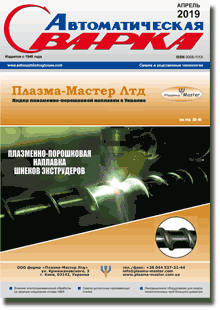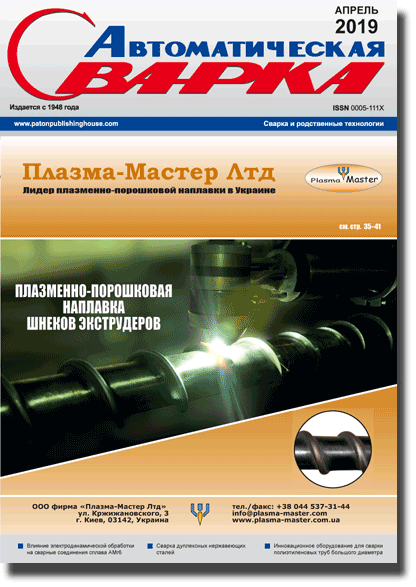| 2019 №04 (01) |
DOI of Article 10.15407/as2019.04.02 |
2019 №04 (03) |

Avtomaticheskaya Svarka (Automatic Welding), #4, 2019, pp. 7-14
Stress concentration in the butt welded joints with a one-sided reinforcement (Review)
A.V. Moltasov, P.M. Tkach, I.G. Tkach, V.V. Verushkin
E.O. Paton Electric Welding Institute of the NAS of Ukraine. 11 Kazimir Malevich Str., 03150, Kyiv, Ukraine. E-mail: office@paton.kiev.uaThe strength of parts and structural elements in the presence of welds largely depends on the design of their joints and assemblies. A sharp change in the geometric shape in their vicinity causes the appearance of additional local stresses or their concentration. The value of these stresses depends on the structural shape of mating of separate elements. That is why they can affect the strength of welded structures in a different way. Stress concentration of in the zone of transition from the weld to the base metal has a significant effect on the resistance of fatigue welds. At the elastic deformation, as a quantitative level of stress concentration, the theoretical stress concentration factor serves, which does not depend on properties of the material, and at a preset type of deformation its value is influenced only by geometric parameters of the stress concentrator, such as its shape and relative dimensions. In practice, the theoretical stress concentration factor is determined by approximate dependencies, as well as by analytical, experimental and numerical methods for investigation of stressed state. The description and analysis of these methods are the aim of the presented review. 37 Ref., 2 Fig.
Keywords: butt welded joint, one-sided reinforcement, axial load, stressed state, tension, bending, stress concentration
Received: 22.01.2019
Published: 04.04.2019
References
1. Trufyakov, V.I., Dvoretsky, V.I., Mikheev, P.P. et al. (1990) Strength of welded joints under alternating loads. Ed. by V.I. Trufyakov. Kiev, Naukova Dumka [in Russian].2. Gassner, E., Haibach, E. (1968) Die Schwingfestigkeit von Schweissverbindungen aus der Sicht einer oerlichen Beanspruchungsmessung. Fachbuchreihe Schweisstechnik, Bd 53. Tragfaehigkeitsermittlung bei Schweissverbindungen, Dusseldorf, Verlag Schweisstechnik, 47-73 [in German].
3. Maddox, S.J. (2003) Review of fatigue design rules for welded structures. The Paton Welding J., 10-11, 94-99.
4. Niemi, E., Fricke, W., Maddox, S.J. (2006) Fatigue analysis of welded components: Designer's guide to the structural hot-spot stress approach. Cambridge, Woodhead Publishing Ltd. https://doi.org/10.1201/9781439824016
5. Hobbacher, A. (2008) Recommendations for fatigue design of welded joints and components. Paris, IIW. https://doi.org/10.1016/j.ijfatigue.2008.04.002
6. Yong Bai, Wei-Liang Jin (2015) Marine structural design. Oxford, Elsevier Publishing.
7. Maddox, S.J. (1991) Fatigue strength of welded structures. Cambridge, Abington Publishing.
8. Herasymchuk, Oleg, Herasymchuk, Olena (2017) Theoretical estimation of fatigue life under regular cyclic loading. Mechanics and Advanced Technologies, 79(1), 49-56. https://doi.org/10.20535/2521-1943.2017.79.96183
9. Neuber, H. (2001) Kerbspannugslehre: Theorie der Spannungskonzentration Genaue Berechnung der Festigkeit. Berlin, Springer-Verlag Berlin Heidelberg [in German].
10. Radaj, D., Sonsino, S.M., Fricke, W. (2006) Fatigue assessment of welded joints by local approaches. Cambridge, Woodhead Publishing Ltd. https://doi.org/10.1201/9781439832806
11. Korostylyov, L.I., Litvinenko, D.Yu. (2016) Analysis and classification of methods for estimation of strength of welded thin-walled structures of hull. Vestnik GUMRF Adm. S.O. Makarov, 3, 104-118 [in Russian]. https://doi.org/10.21821/2309-5180-2016-7-3-104-118
12. Hobbacher, A.F. (2003) Effective notch stress method in comparison with other methods in fatigue design of welded structures. The Paton Welding J., 10-11, 117-121.
13. Vorobiov, E.V., Strizhalo, V.A., Anpilogova, T.V. (2017) Strength of steels at cooling up to 4.2 K under conditions of stress concentration. Problemy Prochnosti, 5, 5-10 [in Russian].
14. Navrotsky, D.I. (1968) Design of welded structures taking into account stress concentration. Leningrad, Mashinostroenie [in Russian].
15. Timoshenko, S.P., Goudier, J. (1975) Theory of elasticity. Ed. by G.S. Shapiro. Moscow, Nauka [in Russian].
16. Kopelman, L.A. (1978) Resistivity of welded assemblies to brittle fracture. Leningrad, Mashinostroenie [in Russian].
17. Trufyakov, V.I. (1973) Fatigue of welded joints. Kiev, Naukova Dumka [in Russian].
18. Karkhin, V.A. (1985) Influence of weld shape on stress distribution at tension of large-thickness butt joints. Avtomatich. Svarka, 9, 25-28 [in Russian].
19. Turmov, G.P. (1976) Determination of stress concentration factor in welded joints. Ibid., 10, 14-16 [in Russian].
20. Stakanov, V.I., Kostylyov, V.I., Rybin, Yu.I. (1987) On calculation of stress concentration factor in welded joints with butt and fillet welds. Ibid., 8, 7-18 [in Russian].
21. Karkhin, V.A., Kopelman, L.A. (1976) Stress concentration in butt joints. Svarochn. Proizvodstvo, 2, 6-7 [in Russian].
22. Tkacz, P., Moltasov, A. (2017) Rozwoj metod oceny stanu naprezenia w elementach konstrukcji spawanych. Czesc 1: Metody tradycyjne. Biuletin Instytutu Spawalnictwa, 4, 52-56 [in Polish]. https://doi.org/10.17729/ebis.2017.4/7
23. Makhnenko, V.I., Mosenkis, R.Yu. (1985) Calculation of stress concentration factors in welded joints with butt and fillet welds. Avtomatich. Svarka, 8, 7-18 [in Russian].
24. Tsumarev, Yu.A. (2010) Influence of asymmetry of one-side butt welds on distribution of stresses in welded joint. Svarka i Diagnostika, 5, 24-27 [in Russian].
25. Tsumarev, Yu.A. (2010) Influence of eccentric tension on stressed state of butt welded joint. Svarochn. Proizvodstvo, 6, 6-10 [in Russian].
26. Ermolaev, G.V., Martynenko, V.A., Marunich, I.V. (2014) Effect of weld convexity sizes on stress state of butt joint during tension. The Paton Welding J., 8, 26-32. https://doi.org/10.15407/tpwj2014.08.04
27. Gurney, T.R. (1979) Fatigue of welded structures. 2nd Ed. London, New York, Melbourne, Cambridge University Press.
28. Asnis, A.E., Ivashchenko, G.A., Anderson, Ya.E. (1982) Effect of weld to base metal transition radius on fatigue resistance of welded joints. Avtomatich. Svarka, 4, 48-51 [in Russian].
29. Karkhin, V.A., Kostylyov, V.I., Stakanov, V.I. (1988) Effect of geometric parameters of butt, tee and cruciform joints on stress concentration factor. Ibid., 3, 6-11 [in Russian].
30. Lukianov, V.F., Parkhomenko, A.A., Rogozin, D.V. (2010) Evaluation of fatigue strength of welded joints with fillet welds based on analysis of local stress state. Svarka i Diagnostika, 6, 17-20 [in Russian].
31. Parton, V.Z., Perlin, P.I. (1981) Methods of mathematical theory of elasticity. Moscow, Nauka [in Russian].
32. Rybin, Yu.I., Stakanov, V.I., Kostylyov, V.I. et al. (1982) Study by finite element method of effect of geometric parameters of tee and cruciform welded joints on stress concentration. Avtomatich. Svarka, 5, 16-20 [in Russian].
33. Kirian, V.I., Dvoretsky, V.I., Malgin, M.G. (2012) Calculation of local stresses in zones of welded joints of large-sized space structures. The Paton Welding J., 4, 2-5.
34. Korostylyov, L.I., Litvinenko, D.Yu. (2015) Evaluation of stress concentration factor in welded assemblies of thin-walled structures by calculation of macro- and microconcentration. Naukovyj Visnyk KhDMA, 13(2), 184-194 [in Russian].
35. Moltasov, A.V., Klochkov, I.N., Knysh, V.V. (2013) Engineering approach of calculation of stress concentration factor in overlap welded joint at tension and bending. Visnyk NTUU KPI. Seriya Mashynobuduvannya, 69(3), 150-157 [in Russian].
36. Goyal, R., El-Zein, M., Glinka, G. (2016) A robust stress analysis method for fatigue life prediction of welded structures. Welding in the World, 60(2), 299-314. https://doi.org/10.1007/s40194-016-0295-y
37. Moltasov, A., Motrunich, S. (2017) Badania lokalnego stanu w obszarze niejednorodnosci geometrycznej doczolowych zlaczy spawanych z jednostronnym nadlewem. Biuletin Instytutu Spawalnictwa, 4, 64-71 [in Polish].
The cost of subscription/purchase order journals or individual articles
| Journal/Currency | Annual Set | 1 issue printed |
1 issue |
one article |
| TPWJ/USD | 384 $ | 32 $ | 26 $ | 13 $ |
| TPWJ/EUR | 348 € | 29 € | 24 € | 12 € |
| TPWJ/UAH | 7200 UAH | 600 UAH | 600 UAH | 280 UAH |
| AS/UAH | 1800 UAH | 300 UAH | 300 UAH | 150 UAH |
| AS/USD | 192 $ | 32 $ | 26 $ | 13 $ |
| AS/EUR | 180 € | 30 € | 25 € | 12 € |
| SEM/UAH | 1200 UAH | 300 UAH | 300 UAH | 150 UAH |
| SEM/USD | 128 $ | 32 $ | 26 $ | 13 $ |
| SEM/EUR | 120 € | 30 € | 25 € | 12 € |
| TDNK/UAH | 1200 UAH | 300 UAH | 300 UAH | 150 UAH |
| TDNK/USD | 128 $ | 32 $ | 26 $ | 13 $ |
| TDNK/EUR | 120 € | 30 € | 25 € | 15 € |
AS = «Automatic Welding» - 6 issues per year;
TPWJ = «PATON WELDING JOURNAL» - 12 issues per year;
SEM = «Electrometallurgy Today» - 4 issues per year;
TDNK = «Technical Diagnostics and Non-Destructive Testing» - 4 issues per year.




